Metallic Zerodur® Mirrors

- Lower Coefficient of Thermal Expansion Than Fused Silica
- Broadband, High-Reflectance Aluminum, Silver, and Gold Coatings
- Ø1/2", Ø1", and Ø2" Optics
PF1011-M01
Ø1" Protected Gold
PF2011-F01
Ø2" UV Enhanced Aluminum
PF1011-G01
Ø1" Protected Aluminum
PF2011-M03
Ø2" Unprotected Gold
PF0511-M01
Ø1/2" Protected Gold
PF0511-M03
Ø1/2" Unprotected Gold
PF1011-P01
Ø1" Protected Silver
PF0511-P01
Ø1/2" Protected Silver

Please Wait
| Quick Links | |
|---|---|
| Reflectance | Mirrors |
| >90% for 250 - 450 nm | UV Enhanced Aluminum Mirrors |
| >90% for 450 nm - 2 µm >95% for 2 - 20 µm |
Protected Aluminum Mirrors |
| >97% for 450 nm - 2 µm >95% for 2 - 20 µm |
Protected Silver Mirrors |
| >96% for 800 nm - 20 µm | Protected Gold Mirrors |
| Unprotected Gold Mirrors | |
Features
- Extremely Low Coefficient of Thermal Expansion
- High-Reflectance Metallic Coatings (See Table to the Right)
- Aluminum, Silver, and Protected Gold Mirrors with Protective Overcoat
- Unprotected Gold Mirrors for Polarization-Sensitive and Ultrafast Applications
- Available in Ø1/2", Ø1", and Ø2" Sizes
Zerodur®* mirrors offer an extremely low coefficient of thermal expansion of 0 ± 0.100 x 10-6 /°C, which is significantly smaller than the value for fused silica, 0.55 x 10-6 /°C. This property makes these mirrors ideal for high-power systems like CO2 lasers, amplified Ti:sapphire lasers, and industrial machining lasers, as well as other applications that are sensitive to thermally-induced beam drift. These Zerodur mirrors are offered with UV enhanced aluminum, protected aluminum, protected silver, protected gold, and unprotected gold coatings. Like other mirrors with metallic coatings, these mirrors offer a high reflectance over a broadband range and are relatively insensitive to angle of incidence.
The protected gold, silver, and aluminum mirrors have a durable SiO2 overcoat, and the UV-enhanced aluminum mirrors feature >90% reflectance in the 250 - 450 nm range. Each protective overcoat helps to protect the metallic coating from tarnishing and prevents damage to the fragile metallic surface. By contrast, unprotected gold offers higher reflectance than protected gold but is more delicate. The overcoat of the protected mirrors results in polarization changes that can be difficult to quantify and sometimes induces absorption in the mid- to far-IR. The unprotected mirrors are ideal for applications where the polarization state needs to be strictly maintained or dispersion in the overcoat of the protected mirrors must be avoided. Please see the Graphs tab above for reflectance curves for each coating.
For applications which require higher reflectance over a smaller wavelength range and limited thermal expansion, Thorlabs offers a line of Zerodur broadband dielectric mirrors. For applications in which thermal expansion is not a concern, we also offer a line of standard plano metallic mirrors. In addition, fused silica broadband dielectric and other mirrors suitable for a wide variety of applications are available.
*Zerodur® is a registered trademark of Schott.
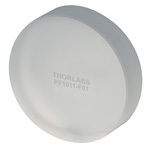
Click to Enlarge
Mirrors Ø1/2" and larger are
laser engraved with their part
number for easy identification.
| Metal-Coated Plano Mirrors Selection Guide | ||||
|---|---|---|---|---|
Wavelength Range |
Avg. Reflectance
|
Coating |
Suffix |
Coating Comparison |
| 250 nm - 450 nm | >90% | UV Enhanced Aluminum | -F01 | Raw Data |
| 450 nm - 20 μm | >90% for 450 nm - 2 µm >95% for 2 - 20 µm |
Protected Aluminum | -G01 | |
| 750 nm - 1 µm | Rs > 99.0% RP > 98.5% |
Ultrafast-Enhanced Silver | -AG | Raw Data |
| 450 nm - 20 μm | >97% for 450 nm - 2 µm >95% for 2 - 20 µm |
Protected Silver | -P01 | |
| -P02a | ||||
| 800 nm - 20 μm | >96% | Protected Gold | -M01 | Raw Data |
| 2 µm - 20 µm | >98% | MIR Enhanced Gold | -M02 | |
| 800 nm - 20 μm | >97% | Unprotected Gold | -M03 | |
| 10.6 µm Laser Line | >99% | Unprotected Gold | -L01 | |
| Metal-Coated Zerodur® Mirrors | ||||
| Economy Front Surface Mirrors with Protected Metallic Coatings | ||||
Metallic Mirror Specifications
| Common Mirror Specifications | |||||||||||||||||||||
|---|---|---|---|---|---|---|---|---|---|---|---|---|---|---|---|---|---|---|---|---|---|
| Item # Prefix | PF0511 | PF1011 | PF2011 | ||||||||||||||||||
| Diameter | Ø1/2" | Ø1" | Ø2" | ||||||||||||||||||
| Diameter Tolerance | +0.0/-0.1 mm | ||||||||||||||||||||
| Clear Aperture | >90% of Diameter | ||||||||||||||||||||
| Thickness | 6 mm | 12 mm | |||||||||||||||||||
| Thickness Tolerance | ±0.2 mm | ||||||||||||||||||||
| Substratea | Zerodur® | ||||||||||||||||||||
| Parallelism | ≤3 arcmin | ||||||||||||||||||||
| Front Surface Flatness (Peak to Valley) | λ/10 @ 632.8 nm | ||||||||||||||||||||
| Surface Quality | 40-20 Scratch-Dig | ||||||||||||||||||||
| Coating Specifications | |||||||||||||||||||||
|---|---|---|---|---|---|---|---|---|---|---|---|---|---|---|---|---|---|---|---|---|---|
| Coating Type | UV Enhanced Aluminum | Protected Aluminum | Protected Silver | Protected Gold | Unprotected Gold | ||||||||||||||||
| Item # Suffix | -F01 | -G01 | -P01 | -M01 | -M03 | ||||||||||||||||
| Reflectance | Ravg >90% for 250 - 450 nm | Ravg > 90% for 450 nm - 2 μm Ravg > 95% for 2 μm - 20 μm |
Ravg > 97% for 450 nm - 2 µm Ravg > 95% for 2 - 20 µm |
Ravg > 96% for 800 nm - 20 μm |
Ravg >97% for 800 nm - 20 μm | ||||||||||||||||
The shaded regions in the graphs denote the ranges over which we guarantee the specified reflectance. Please note that the reflectance outside of these bands is typical and can vary from lot to lot, especially in out-of-band regions where the reflectance is fluctuating or sloped.
UV-Enhanced Aluminum Coating (250 nm - 450 nm)
Protected Aluminum Coating (450 nm - 20 µm)
Protected Silver Coating (450 nm - 20 µm)
Protected Gold Coating (800 nm - 20 µm)
Unprotected Gold Coating (800 nm - 20 µm)
| Posted Comments: | |
| No Comments Posted |

Our UV-Enhanced Aluminum mirrors are a cost effective solution for UV applications. Because bare aluminum is extremely delicate and susceptible to damage, a protective overcoat is layered over the aluminum to prolong the life of the mirror. Our UV-enhanced coating allows >90% reflectance in the 250 - 450 nm range.
The plot to the right shows the measured reflectance of UV-enhanced aluminum as a function of wavelength. The shaded region denotes the 250 - 450 nm range. Data was obtained at a 45° angle of incidence. See the Graphs tab for more data.

Protected Aluminum coated mirrors are a good option for many general broadband applications. A SiO2 protective overcoat is used to protect the delicate aluminum coating, making it suitable for laboratory and industrial use. The protected aluminum coating has a smaller chance of tarnishing than protected silver in a high humidity environment and gives a reflectance that most closely matches the reflectance of a bare aluminum coating. These mirrors have an average reflectance greater than 90% from 450 nm to 2 µm and greater than 95% over the 2 to 20 µm spectral range.
The plot to the right shows the measured reflectance of protected aluminum as a function of wavelength. The shaded region denotes the region over which we recommend using these optics. See the Graphs tab for more data.

Silver coated mirrors offer the highest reflectance in the visible-to-NIR spectrum of any metallic mirror, while also offering high reflectance in the IR. From 450 nm - 2 µm, our silver-coated mirrors have an average reflectance of >97%, and from 2 µm to 20 µm, they have an average reflectance of >95%. In order to protect them from oxidation, these mirrors have a durable SiO2 overcoat. Due to their high reflectance over the 450 nm - 20 µm range, these mirrors are well suited for use with femtosecond pulsed lasers.
The plot to the right shows the measured reflectance of protected silver as a function of wavelength. The shaded region denotes the range over which we recommend using these optics. See the Graphs tab for more data.
Care and Handling
Silver coated mirrors require additional care due to their susceptibility to damage from environmental conditions and improper handling. Fingerprints, contact with abrasive surfaces, and environments with high humidity or temperature will diminish the effectiveness of the protective overcoat leaving the silver coating susceptible to oxidation and degradation. When working with silver mirrors, follow standard practices for handling optics. Latex gloves or similar protective coverings are recommended to prevent oil and other residues on the user’s fingers from reaching the optical surface. Even with such precautions, care should be taken not to touch the mirrored face or edges. Silver mirrors should be used and stored in areas at room temperature with minimal humidity. For information on how to clean mirrors and other optics, visit our Optic Cleaning Tutorial.

Protected gold coatings are ideal for use over the entire IR range, with an average reflectance in excess of 96% for 800 nm - 20 µm. A protective SiO2 overcoat is layered over the gold to make it damage resistant and easy to clean.
The plot to the right shows the measured reflectance of protected gold as a function of wavelength. The shaded region denotes the range over which we recommend using these optics. See the Graphs tab for more data.

Unprotected gold offers higher reflectance than protected gold, but is more delicate. Additionally, these mirrors can be used in applications where the polarization state needs to be strictly maintained or to prevent dispersion due to the overcoat of protected gold mirrors. The overcoat of protected gold mirrors results in polarization changes that can be difficult to quantify and sometimes induces absorption in the mid-to-far IR.
The plot to the right shows the measured reflectance of protected gold as a function of wavelength. The shaded region denotes the range over which we recommend using these optics. See the Graphs tab for more data.
NOTE: Mounts that utilize retaining rings are likely to damage the surface of these mirrors. Bare gold does not oxidize in air, but it can be easily damaged by fingerprints, aerosols, or the slightest contact with any abrasive material. Unprotected gold mirrors should only be handled when necessary and always held by the sides. Latex gloves or a similar protective covering should be worn to prevent oil from fingers from reaching the surface. No attempt should be made to clean the surface other than blowing off dust with clean, dry air or nitrogen. Any other cleaning method may damage the surface.
 Products Home
Products Home













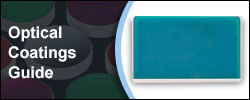
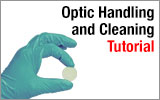
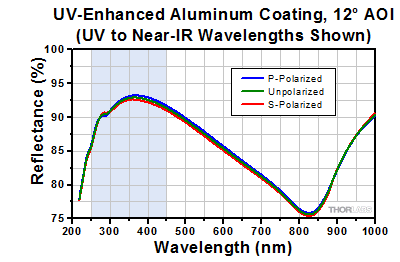
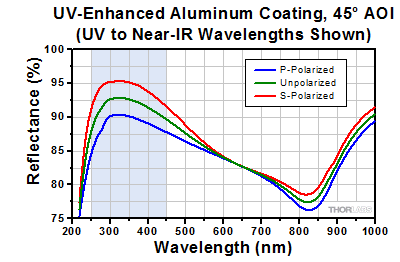
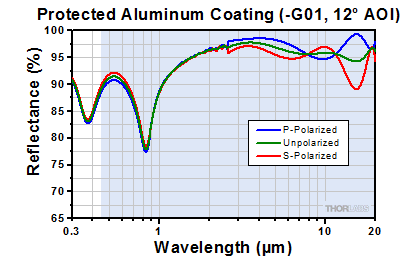
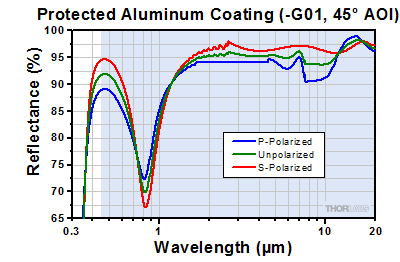
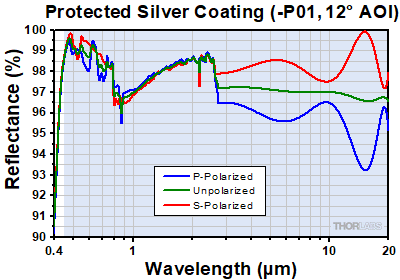
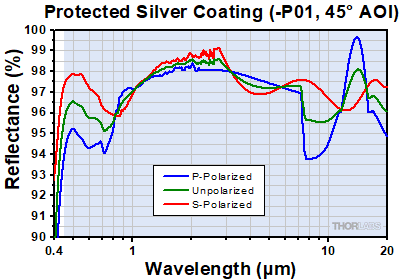
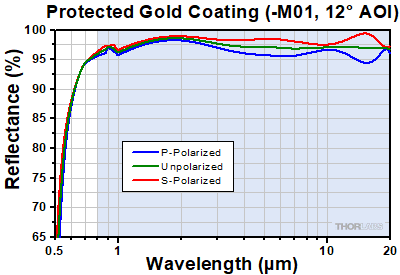
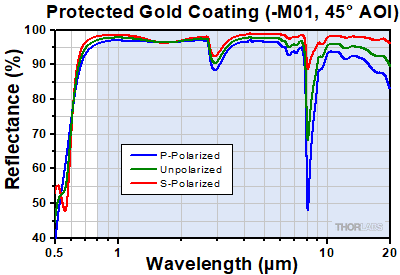
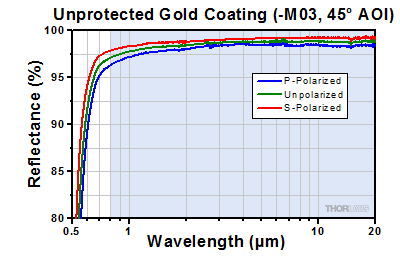
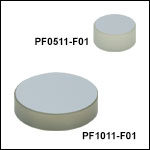
 Zoom
Zoom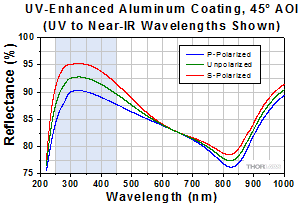
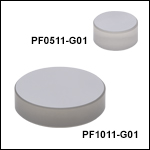
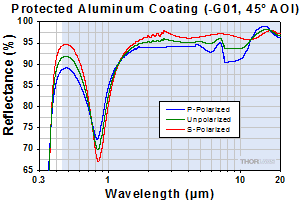
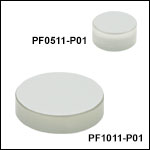
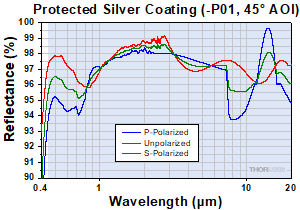
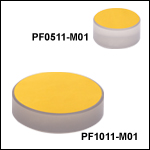
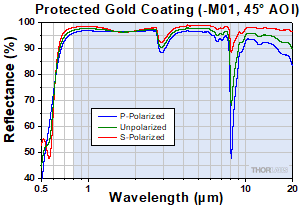
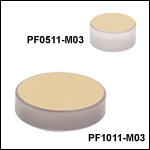
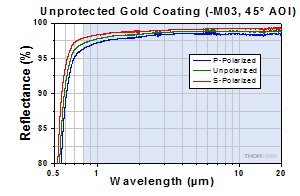
 Metallic Zerodur Mirrors
Metallic Zerodur Mirrors